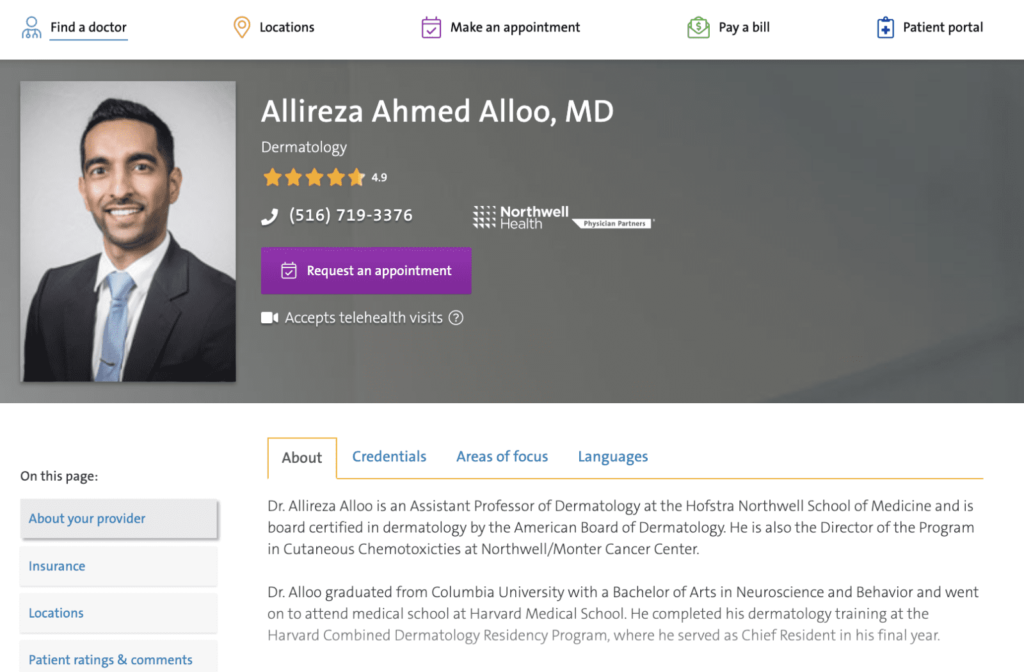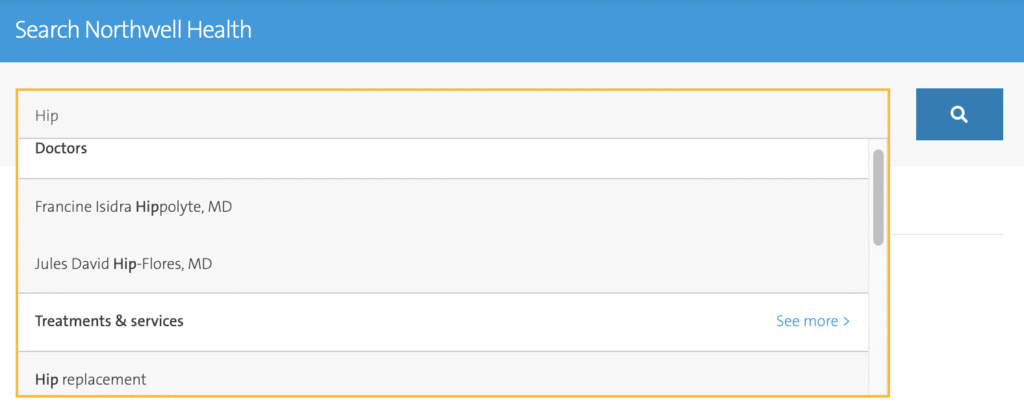28K+
physician profiles and content pages
70K+
employees
12
people on technical team
How one of America’s largest healthcare providers transformed its digital experience by applying retail best practices to healthcare search.
“Why should our patients completely change their search behavior just because we’re healthcare and not Amazon, Costco, or Walmart?”
— Mike Salogub, Business Analyst, Digital Strategy & Innovation
When healthcare meets retail experience
As consumer expectations evolve, the line between healthcare and retail continues to blur. Patients no longer separate their digital experiences—the same person who effortlessly navigates Amazon’s vast product catalog expects similar ease when searching for medical information or booking a doctor’s appointment.
Northwell Health, one of the largest healthcare providers in the U.S., recognized this shift. With 25 hospitals, 750 outpatient centers, and 70,000 employees serving millions of patients, Northwell understood that their digital presence needed to match the excellence of their medical care.
But with over 28,000 pages on their website—including 13,000+ physician profiles and 15,000+ content pages covering conditions, treatments, and services—patients were struggling to find the specific information they needed. More concerning, Northwell wasn’t seeing many appointments booked directly through their website.
The diagnosis: Search as a critical vital sign
Like many healthcare organizations, Northwell had previously viewed their website as primarily informational. In fact, they had completely revamped six homepages in just five years, but each iteration failed to significantly improve patient engagement or conversions.
This time, rather than looking at peer healthcare providers for inspiration, Northwell turned to retail—an industry that had mastered the art of digital discovery and conversion. Their technical team of just 12 people set ambitious goals focused on “findability”—recognizing that even with world-class doctors and facilities, patients couldn’t access services they couldn’t find.
“We wanted to transcend what other healthcare providers were doing and offer an Amazon-quality user experience. Our website should empower patients with information and services while supporting business goals.” — Northwell team member
The treatment plan: Retail-inspired search
Northwell partnered with Lucidworks to implement a search solution with features that patients had come to expect from their favorite shopping sites:
- Improved search relevance to help patients quickly find what they’re looking for
- Content type grouping to simplify the complexity of medical terminology
- Typeahead functionality that provides increasingly accurate results with each keystroke
- Spelling correction to eliminate “no results” frustration when patients misspell terms
Before these improvements, search results often made little sense to patients. Someone searching for “TAVR” (a surgery that puts a stent in the aortic valve) would receive a link to general cardiology rather than specific procedure information. A search for “cardiac catheterization” would direct patients to a cardiology practice in Staten Island—a location that didn’t even perform the procedure.
Designing for patient conversion
Beyond improving search functionality, Northwell redesigned their site with clear conversion paths. Individual doctor profiles and practice pages now prominently feature “book an appointment” buttons. Navigation bars with calls-to-action (CTAs) follow users as they scroll, making appointment scheduling—what Northwell considers conversions—easy and intuitive.

The “find a doctor” feature received a complete overhaul with retail-inspired elements:
- “Others have searched” recommendations to encourage browsing
- “Recently viewed physicians” and “favorited physicians” lists for easy return visits
- Availability-based physician search for time-sensitive needs
Clicking onto a physician profile page, patients now find a professional photo alongside a prominent “book an appointment” button. Scrolling down reveals the doctor’s bio, credentials, areas of focus, and practice locations. A “meet the team” section highlights other physicians this doctor collaborates with—creating additional conversion opportunities if the primary physician is unavailable.
Medical terminology made accessible
With Lucidworks improving relevancy, patients searching for “TAVR” now see the procedure’s informational page first—explaining what it is, when it’s necessary, how it’s performed, along with risks and recovery data. Searches for “cardiac catheterization” properly direct to the procedure’s information page.
The technical team has also enhanced findability by analyzing queries and adding synonyms. When a patient searches for “heart attack,” documents written about “myocardial infarction” (the medical term) now appear, bridging the gap between medical terminology and everyday language.
Typeahead and content grouping work together to simplify complex medical searches. Previously, a query for “hip” would show all possible results with “hip surgery” first—potentially alarming for someone just seeking information. Now, as patients type, suggested pages update and group by content type: physicians, treatments, or conditions—helping patients quickly narrow down what they’re looking for.

The results: A healthier digital experience
By applying retail best practices to healthcare search, Northwell has transformed their website from an information repository to a patient engagement platform. Patients can now navigate to relevant doctor profiles, research treatments or conditions, and book appointments with ease.
Search recommendations promote browsing, favorited physician lists guide patients to action, and prominently placed CTAs increase conversions. For the first time in years, Northwell didn’t need to completely redesign their website in December—instead, they continued refining their search experience and adding features to further enhance patient engagement.
The future of healthcare discovery
As Northwell continues evolving their digital strategy, they’re planning several enhancements:
- Using signals and machine learning to boost content and automate relevancy
- Implementing CTAs directly within search results to reduce clicks to conversion
- Adding AI-powered misspelling detection to eliminate “no results” scenarios
- Introducing faceted search for more flexible site navigation
“By looking outside the medical industry for inspiration, we’ve enabled our patients with a retail-caliber online experience that far surpasses our competitors’ websites. Our patients are now browsing treatments, favoriting doctors, and booking appointments with the click of a button—just as they would shop for products online.” — Northwell team member
Northwell’s journey demonstrates that in today’s digital landscape, the principles of excellent search transcend industries. By meeting patients where they are—with experiences familiar from their everyday digital interactions—healthcare providers can simultaneously improve patient satisfaction and achieve business objectives.
With a technical team of just 12 people, Northwell Health transformed its digital presence serving 25 hospitals and 750 outpatient centers, making over 28,000 web pages easily discoverable for patients and proving that in healthcare, as in retail, if you can’t find it, you can’t use it.
